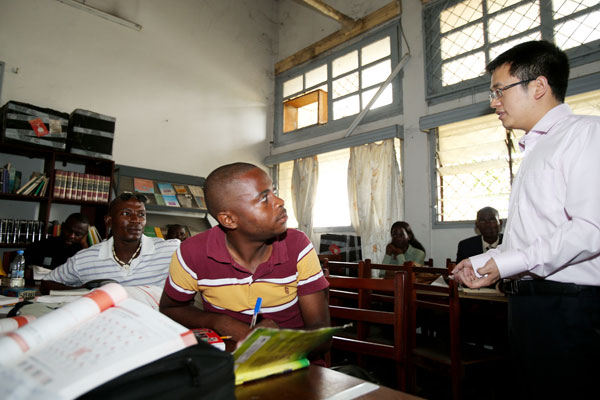African students get real-life experience
 0 Comment(s)
0 Comment(s) Print
Print E-mail China Daily, March 26, 2013
E-mail China Daily, March 26, 2013
"We are in Africa, but most of us understand China through the Western media. I wanted to go by myself to explore the country on my own, not through a Western perspective," said Hicham Erfiki, a second year PhD student from Morocco at Peking University.
|
|
|
A student listens to his Chinese teacher at a classroom at the Confucius Institute of University Marien Ngouabi in Brazzaville, the Republic of Congo, on March 11. [Photo: Xinhua] |
As a member of the PKU African student association, Erfiki helped organize many activities, such as conferences, sporting and cultural events, to promote African culture in Beijing.
"I can see more PKU students are interested in our activities," said Erfiki, 28, who has lived in China for almost seven years.
According to the Ministry of Education, 27,052 African students studied in China in 2012, an increase of 30.41 percent on the previous year. That's a significant change from 2003, when just 1,793 students from Africa studied in China.
China has increasingly become one of the desired overseas study destinations for African talents like Erfiki.
Erfiki came to Peking University in 2007 after earning a bachelor's degree from the Universite Mohammed V-Souissi in Morocco.
With increasing Sino-African cooperation, Erfiki said Africa needs more people who possess a deeper understanding of China.
Erfiki said that many educated youth in Africa only know about China through their studies in Europe and the United States, which leads to a misunderstanding about the country.
"I choose something different to be distinguished," he said. "I am lucky to be in a good school in China, better than many European schools," he said.
The Chinese government has made efforts to encourage cooperation with Africa in higher education.
A program called the 20 Plus 20 Project was initiated in 2009 at the Forum on China-Africa Cooperation and launched in 2010 by the Ministry of Education. The program partnered 20 universities from China with 20 universities from Africa. The Chinese universities provide student and faculty exchange opportunities, government scholarships and Chinese-language training to African students.
Peking University, where Erfiki attended, partnered with Cairo University in Egypt.
In addition to sending students and faculty to Cairo University, the partners are exploring more in-depth cooperation in research, faculty training and curricula sharing.
Wang Suolao, an associate professor and the director of the Center for Middle Eastern Studies in the School of International Studies at Peking University, who is in charge of the 20 Plus 20 Project at the school, told China Daily that the faculty plans to translate two Chinese classical works into Arabic, and two Arabic masterpieces into Chinese.
Some may think that the cooperation only benefits African universities, but Wang, a Middle Eastern studies scholar, said the cooperation is mutually beneficial.
"Cairo University has strengths in many areas, such as archaeology and Islamic studies. Peking University is famous for humanities and social sciences. The cooperation can fit needs for both schools," he said, adding that finding the right partner is key to building high-quality cooperation.
Peking and Cairo cooperation dates back to the 1950s.
The first group of Africans that studied at Peking University was from Egypt. Today, African students at Peking University, like Erfiki, major in not only Chinese but also political science, management, journalism and other subjects.
"It is a way to promote China's soft power in Africa," Wang said.
In the past, the majority of African and Middle East families only sent their children to Europe and the US. But with the Confucius Institutes and programs such as 20 Plus 20, more African youth understand China better and are starting to learn Chinese, Wang said.
Wang said there are some obstacles for further cooperation, such as political instability, the traditional belief that Europe and the US are more developed, and a lack of money.
"Plane tickets cost a lot," Wang said.
However, efforts have paid off. Without even knowing how to say hello in Chinese, the young Moroccan came to Beijing to study international politics for his master's degree. Now he speaks fluent Chinese and is continuing his PhD studies at Peking University.






